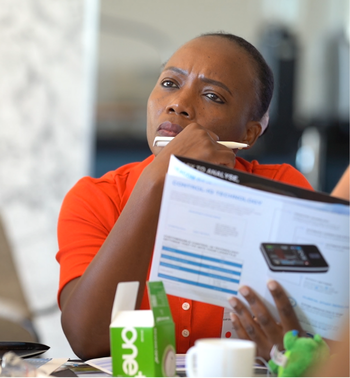5 September 2025
From hands-on diabetes technology demos to thought-provoking case studies, this year’s Diabetes Technology Foundation Educational Workshop brought together more than 60 professionals from across King’s Health Partners.
Designed to boost confidence, skills, and collaboration in diabetes care, the event brought together diabetes specialist nurses, mental health clinicians, dietitians, pharmacists, and other healthcare professionals, all united by a shared goal: to give people living with diabetes the best possible support.
An introduction to diabetes technology
Diabetes technology refers to devices and digital tools that help people manage their condition more safely and effectively. This includes continuous glucose monitors (CGM), flash sensors, insulin pumps, connected pens, and hybrid closed-loop systems that automatically adjust insulin delivery. It is relevant not only for people living with diabetes and their families, but also for clinicians across specialties, mental-health professionals, carers, and community teams, because day-to-day success with these tools depends on coordinated support beyond specialist diabetes clinics.
Advancing the adoption of technology in the NHS
At the workshop, experts explained how clinicians and patients could help advance diabetes technology within the NHS. The key takeaways were:
- Co-design and feedback: People living with diabetes, including those with SMI and other access needs, bring vital real-world experience. Their feedback on usability, comfort, and daily challenges helps refine devices and services.
- Data-informed care: Clinicians can move beyond single glucose values to use device data collaboratively with patients, focusing on patterns, behaviours, and shared decision-making.
- Skills and confidence: Both patients and staff benefit from practical training in sensor changes, interpreting pump/CGM data, and handling alarms or failures. Building digital literacy and confidence reduces device anxiety and errors.
- Equity by design: Patients and clinicians can champion inclusive practice, ensuring adjustments for language, neurodiversity, and mental health, and making sure underserved groups get equal access to technology and support.
- Interdisciplinary teamwork: Progress happens when diabetes specialists, mental-health teams, primary care, and industry partners work together with clear communication and continuity across services.
Dulcie Wood presents a mind and body approach
A highlight of this year’s programme was a powerful session on supporting people with severe mental illness (SMI) through diabetes technology. By bringing in mental health professionals as both participants and speakers, the workshop showcased the mind-and-body approach at the heart of KHP, breaking down barriers between physical and mental health care.
Diabetes is two to three times more common in people with SMI, contributing significantly to early mortality. The data also revealed around 20-25% of those on the SMI register live with diabetes, making this a major public health concern.
In her presentation, Dulcie Wood, Physical Health Specialist Nurse at South London and Maudsley NHS Foundation Trust, brought attention to a common misconception around the barriers to accessing care. She said barriers were systemic, not individual, with missed appointments, disengagement, or “non-compliance” often reflecting service design issues (communication, accessibility, trauma histories) rather than patient unwillingness. Dulcie also shared how small changes at work such as accessible information, consistent follow-ups, and genuine joint working between diabetes and mental-health teams, can transform engagement and outcomes.
One participant said:
The South London and Maudsley NHS FT presentation really brought it home to me. It enabled networking and brought us together as a team.
Improving patient outcomes through technology
The Diabetes Technology Foundation Educational Workshop featured immersive device rotations, giving attendees the opportunity to trial insulin pumps, continuous glucose monitors, and connected pens from leading providers, building hands-on skills and practical confidence. In the afternoon, a diverse patient panel offered moving, honest accounts of life with diabetes technology, reminding everyone of the importance of listening to patient voices in designing care.
In feedback one attendee said:
“The patient panel was eye-opening. Hearing their voices reminded me why we do this work.”
The aim of the workshop was to deliver:
- Faster, safer adoption of technology.
- Better engagement for people with complex needs.
- More consistent support across the system, through new cross-organisation links.
- Equity and inclusion in practice, focusing on patient voices and reasonable adjustments to close persistent gaps in who benefits from diabetes technology.
- Sustained learning beyond the day.
The impact of the workshop was clear. Attendees praised the hands-on learning and the unique mix of industry, clinical, and patient perspectives. This success was built on collaboration between our multidisciplinary team, industry partners, and patient contributors. It also advances the KHP Strategy to 2030 by driving innovation in care, integrating mind and body health, and building a skilled, confident workforce ready to deliver the next generation of diabetes services.
The Diabetes Technology Foundation Educational Workshop was a free day event for KHP staff, delivered in collaboration with our multidisciplinary team, industry partners, and patient contributors. King’s Health Partners Diabetes, Obesity and Endocrinology plan to run this event annually to address a clinical educational need, so check out our events pages to make sure you don't miss their next workshop.
Upcoming event
King's Health Partners Diabetes, Endocrinology and Obesity, alongside Caribbean & African Health Network and Diabetes UK, have partnered with Diabetes Africa for the upcoming Diabetes Africa UK Forum 2025. Returning for its third year on Wednesday 26 November, this forum has become a key space to take stock of work happening nationwide, build skills and keep equity at the centre of diabetes care for people of Black, African and African-Caribbean heritage.
The 2025 UK Forum is sponsored by Insulet, Eli Lilly and Company, and Novo Nordisk who have had no input into the topics discussed or the selection of speakers.





